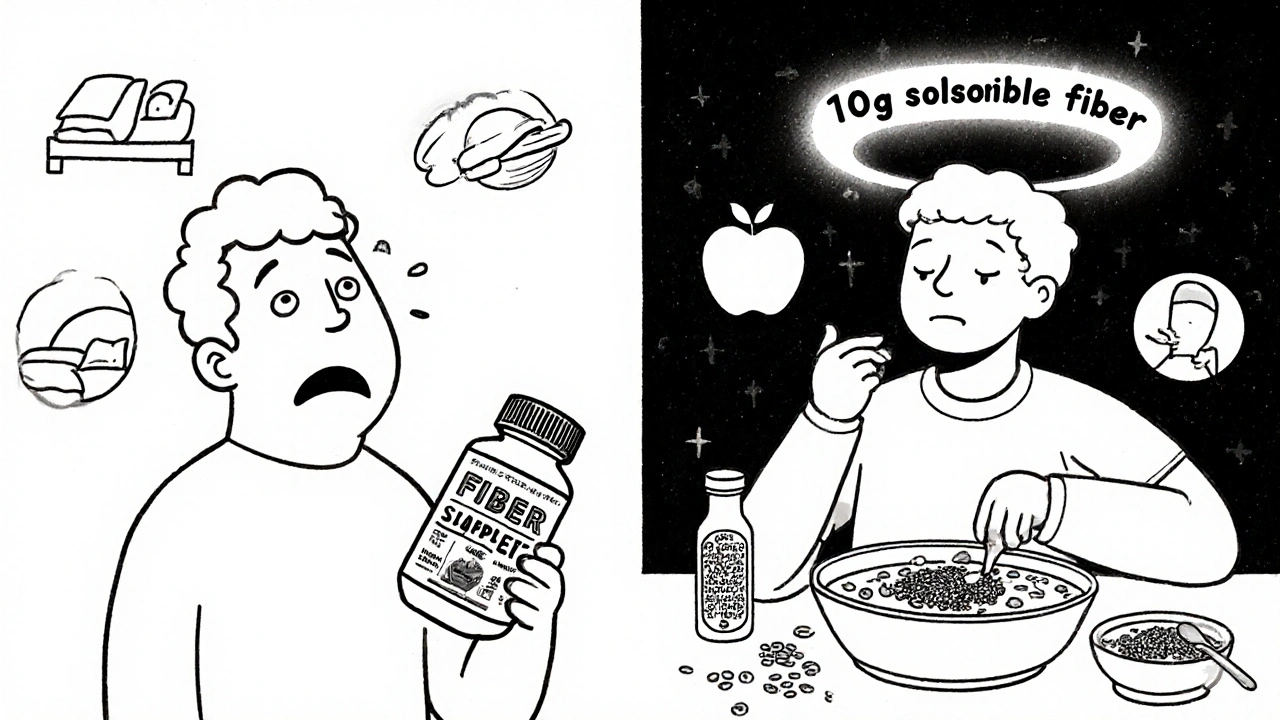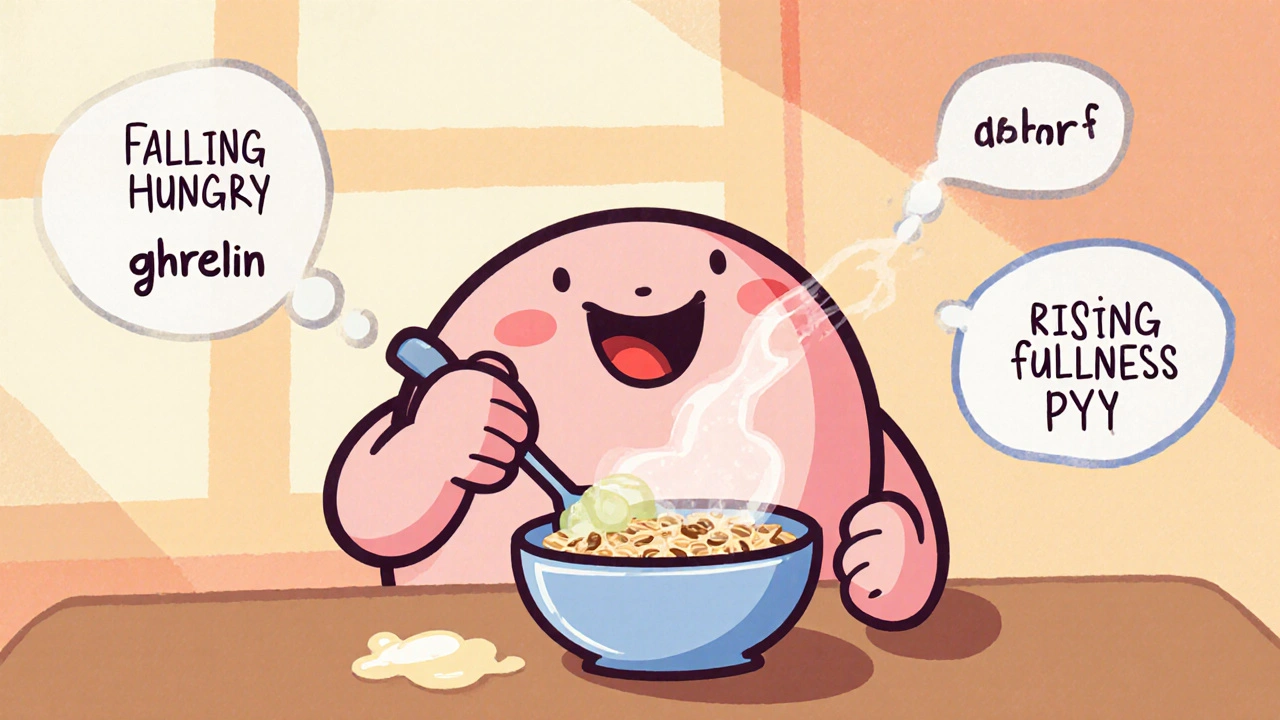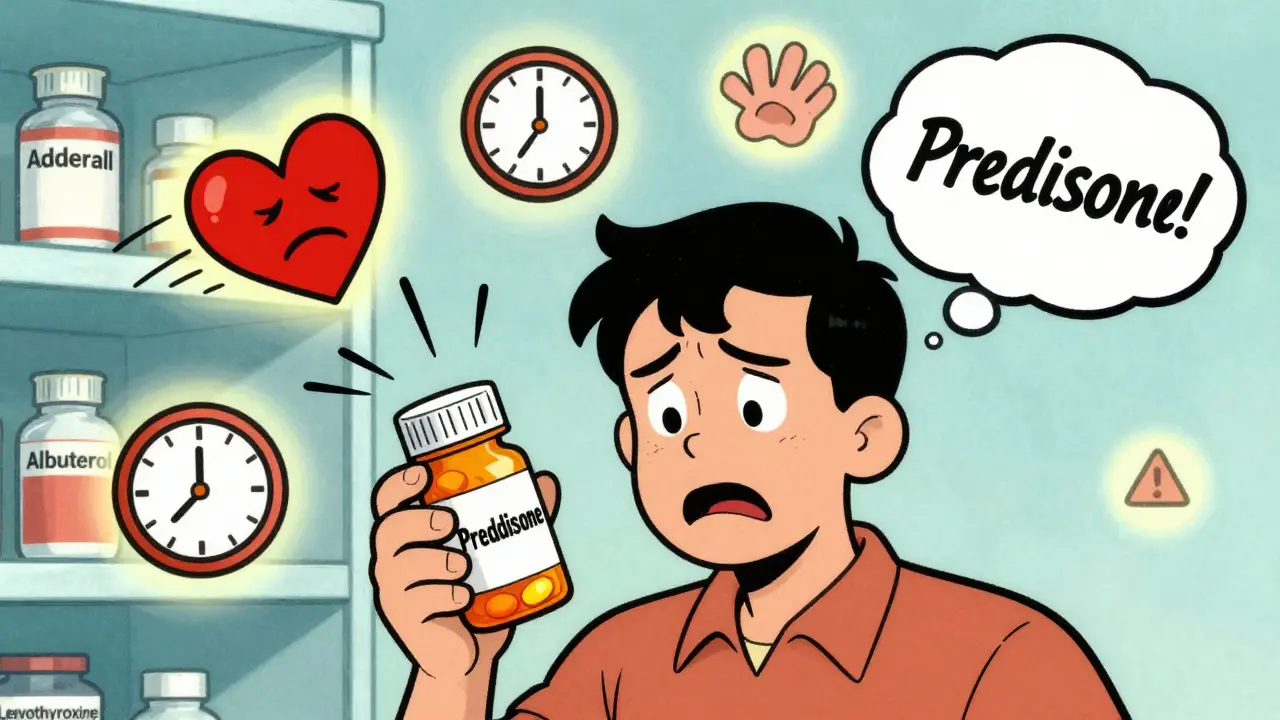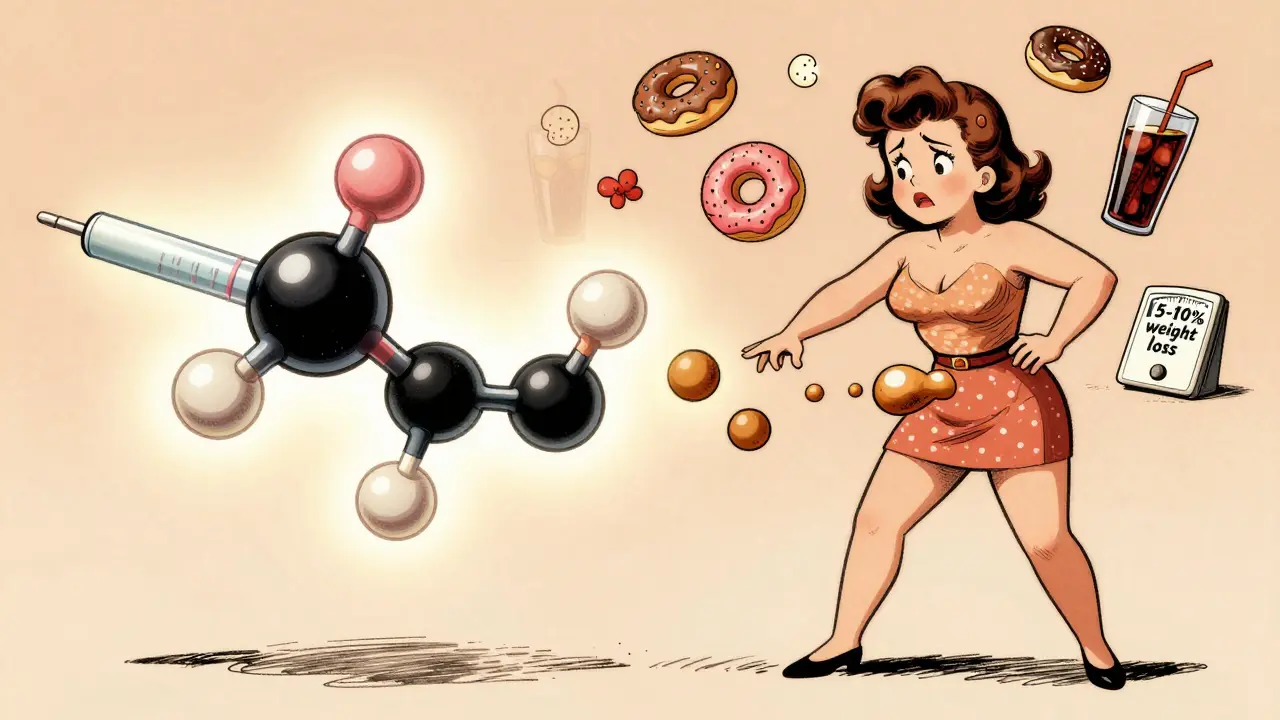When it comes to losing weight, most people focus on cutting calories, skipping carbs, or chasing the latest supplement. But one of the most powerful, science-backed tools for weight control is sitting right on your plate - fiber. Not just any fiber. The kind that actually changes how your body feels hunger, absorbs food, and stores fat. And not all fiber is the same. There are two main types: soluble and insoluble. One helps you feel full longer. The other keeps things moving. If you’re trying to lose weight and you’re not paying attention to the difference, you’re missing out.
What soluble fiber does for your appetite
Soluble fiber doesn’t just pass through your system. It turns into a thick, gel-like substance when it hits water. Think of it like oatmeal soaking up milk - that’s exactly what happens inside your gut. This gel slows down digestion, delays stomach emptying by 25-30%, and makes you feel full longer. A study published in May 2023 tracked people who took psyllium husk daily. After eight weeks, they lost 3.2% of their body weight - more than double the placebo group. Why? Because their hunger hormones shifted. Ghrelin, the “I’m hungry” signal, dropped. Peptide YY, the “I’m full” signal, rose. That’s not magic. That’s physics and biology working together.Viscous soluble fibers - like psyllium, beta-glucans, glucomannan, and pectin - are the real players here. They don’t just add bulk. They physically block some fat from being absorbed. Studies show they can reduce fat absorption by 15-20%. That means if you eat a meal with 20 grams of fat, up to 4 grams might just pass right through. And because this gel slows down how fast sugar enters your bloodstream, your insulin doesn’t spike. No insulin spike means less fat storage.
One of the most effective ways to use soluble fiber for weight control? Take 3-5 grams of it 15-30 minutes before your main meals. In clinical settings, people who did this ate 10-15% fewer calories at that meal. That’s like eating a whole sandwich less every day. Over a month, that adds up. And the best part? You don’t need a pill. Half a cup of cooked lentils has about 7 grams of soluble fiber. One medium apple? Nearly 2.4 grams, and 71% of it is soluble. Oats? Even better - beta-glucans in oats are proven to reduce appetite and stabilize blood sugar.
Insoluble fiber: the quiet helper
Insoluble fiber doesn’t dissolve. It doesn’t form gel. It doesn’t directly affect your hunger hormones. But it’s still essential. Think of it like a broom. It sweeps through your intestines, adds bulk to stool, and speeds things up. For every 10 grams you eat, you get 3-5 grams of extra bulk. That’s why whole wheat bread, bran, nuts, and vegetables like celery and broccoli are so good for regularity. If you’re constipated, this is your fix.But does it help you lose weight? Indirectly, yes. When your digestion runs smoothly, you’re less bloated. You feel lighter. You’re less likely to snack out of discomfort or sluggishness. And a healthy gut lining - fed by the right fiber - supports good bacteria that are linked to lower obesity rates. The Cleveland Clinic says insoluble fiber reduces transit time by 24-48 hours. That means toxins and excess waste don’t sit around. But if you’re looking for a direct appetite suppressant, insoluble fiber won’t give you that. It’s not the star of weight loss. It’s the reliable backup.

The numbers don’t lie: what actually works
Let’s cut through the noise. A 2023 analysis of 62 studies found that eating 7 grams of viscous soluble fiber daily for 10 weeks led to an average weight loss of 0.75 pounds and a 0.25-inch smaller waist. That sounds small. But consider this: people who stuck with fiber-rich whole foods for six months had an 82% adherence rate. Those on supplements? Only 54%. Why? Because supplements feel like a chore. Whole foods feel like eating.Psyllium is the most studied supplement for weight loss. In one trial, it reduced BMI by 2.1% and visceral fat by 4.3%. But here’s the catch: those results only happened when people were also eating fewer calories. Fiber doesn’t work in a vacuum. It’s not a magic pill. It’s a tool that makes eating less feel easier.
And the data backs up whole foods over pills. A Healthline survey of over 1,200 people found that 63% of those who successfully lost weight with fiber did it by eating more beans, oats, apples, and vegetables - not powders or capsules. Why? Because those foods come with vitamins, antioxidants, and phytonutrients that fiber supplements don’t have. They’re not just fiber. They’re complete packages.
How to actually use fiber to lose weight
If you’re new to fiber, don’t go from zero to 30 grams overnight. That’s how you end up bloated, gassy, and miserable. The rule of thumb: add 5 grams per week until you hit your target. Most adults need 25-38 grams total per day. For weight control, aim for at least 10-15 grams of soluble fiber. Here’s how to get there without stress:- Start your day with oats. One cup of cooked oats gives you 4 grams of soluble fiber - mostly beta-glucans.
- Snack on an apple. It’s got 2.4 grams of fiber, and 71% of it is soluble. Eat the skin.
- Add beans or lentils to salads and soups. Half a cup has about 7-8 grams of fiber, half of it soluble.
- Try chia or flaxseeds. One tablespoon of ground flax adds 2.8 grams of soluble fiber and omega-3s.
- Drink water with every fiber-rich meal. For every 5 grams of supplemental fiber, drink 16-24 ounces of water. Otherwise, you risk constipation.
Timing matters too. Taking psyllium or glucomannan 20 minutes before dinner helps you eat less without even trying. You don’t need to count calories - you just feel satisfied sooner.

Why supplements often fail
The fiber supplement market is booming. Psyllium-based products make up 32% of it. But Amazon reviews tell a different story. While 76% of 5-star reviews for psyllium say “I stopped snacking,” 42% of Reddit users reported bloating and gas when they started too fast. Inulin, another popular supplement, got 34% negative reviews for “severe bloating.” Why? Because inulin ferments fast in the gut and feeds bacteria that produce gas. It’s fine for some. Not for others.Supplements also lack the natural food matrix. That means no vitamins, no antioxidants, no other fibers working together. They’re single tools. Whole foods are toolkits. And research shows toolkits win.
Plus, supplements are easy to skip. You have to remember to take them. You have to mix them. You have to drink water. Eating an apple? You do that anyway. It’s part of life.
The bottom line
Soluble fiber is your appetite regulator. Insoluble fiber is your digestion cleaner. For weight control, you need both - but soluble is the one that changes the game. It slows digestion, reduces fat absorption, lowers blood sugar spikes, and makes you feel full longer. You can’t fake it with a pill. The best results come from eating real food: oats, beans, apples, chia, lentils, and vegetables.Don’t expect miracles. Fiber won’t make you lose 20 pounds in a month. But if you add 10 grams of soluble fiber a day - through food - and drink enough water, you’ll eat less without feeling deprived. You’ll feel lighter. Your digestion will improve. And over time, that adds up to real, lasting weight loss.
And if you’re still not seeing results? Look at the bigger picture. Fiber works best when paired with sleep, movement, and stress management. It’s not the hero. It’s the foundation. Build on it, and the rest follows.
Can soluble fiber help me lose belly fat?
Yes. Viscous soluble fibers like psyllium and beta-glucans have been shown in clinical studies to reduce visceral fat - the deep belly fat linked to metabolic disease. In one 8-week trial, participants taking psyllium lost 4.3% of their visceral fat, while the placebo group lost just 1.2%. This happens because soluble fiber improves insulin sensitivity and reduces inflammation, both of which drive fat storage around the organs.
Is insoluble fiber useless for weight loss?
Not useless - but not direct. Insoluble fiber doesn’t reduce hunger or block fat absorption. But it helps prevent bloating and constipation, which can make you feel heavier. A healthy gut environment, supported by insoluble fiber, also feeds good bacteria that are linked to lower obesity rates. So while it won’t shrink your waistline on its own, it creates the conditions for soluble fiber to work better.
How much fiber should I eat daily to lose weight?
Aim for 25-38 grams of total fiber per day. For weight control, at least 10-15 grams should come from soluble, viscous sources like psyllium, oats, beans, and apples. Most people get less than half that. Start slow - add 5 grams per week - to avoid gas and bloating. Once you hit 15 grams of soluble fiber daily, benefits tend to plateau.
Should I take fiber supplements or eat whole foods?
Whole foods are better. Studies show people who get fiber from food stick with it longer and lose more weight over time. Supplements like psyllium can help if you’re falling short, but they lack the vitamins, antioxidants, and other fibers found in real food. Think of supplements as a bridge - not a destination.
Why do I get bloated when I eat more fiber?
It’s usually because you increased too fast or didn’t drink enough water. Fiber absorbs water to form gel. If you don’t hydrate, it hardens and causes constipation. If you suddenly add 20 grams of fiber, your gut bacteria ferment it too quickly, producing gas. Slowly increase intake by 5 grams per week and drink 16-24 ounces of water per 5 grams of fiber to prevent this.



Eric Healy
November 18, 2025 AT 06:47fiber isnt magic its just a tool like breathing or drinking water you dont get medals for doing it right but you sure as hell get punished when you dont
Shannon Hale
November 18, 2025 AT 08:22OMG finally someone who gets it!!! I’ve been screaming this from the rooftops for years-soluble fiber is the UNSEEN MVP of weight loss. People think it’s about willpower but nooooo it’s about GLUCOSE SPIKES and HORMONAL CHAOS. Psyllium before dinner? I’m basically a walking fat-burning machine now. Also I’ve stopped snacking on nachos at 2am. No joke. Science is real.
Holli Yancey
November 19, 2025 AT 04:44I appreciate how grounded this is. So many people chase supplements like they’re potions from a wizard. I just eat lentils, oats, and apples-and yes, I still eat pizza on weekends. But now I don’t feel like a bloated sack of regret afterward. Small changes. Big difference.
Gordon Mcdonough
November 20, 2025 AT 10:26WHAT THE FUCK IS THIS BULLSHIT I’VE BEEN EATING PSYLLIUM FOR 6 MONTHS AND I’M STILL FAT AND MY GUT FEELS LIKE A WAR ZONE I THINK THIS IS A LIBERAL CONSPIRACY TO MAKE US EAT MORE VEGGIES AND STOP EATING BURGERS AND I LOVE BURGERS I’M AMERICAN DAMN IT
Jessica Healey
November 20, 2025 AT 21:15so i tried the chia seeds thing and i swear to god i thought i was gonna die. like my stomach turned into a balloon that was also a tornado. then i started drinking water. like, actual water. and now? i feel like a new person. also my skin cleared up. who knew fiber was basically a glow-up?
Levi Hobbs
November 21, 2025 AT 18:42Just wanted to say thank you for the practical advice. I started adding oats and apples last week and I didn’t even realize I was eating less until I looked at my food log. It’s not about restriction-it’s about satisfaction. Also, drinking water with fiber? Genius. I was doing it wrong for years.
henry mariono
November 23, 2025 AT 10:58I’ve been on this path for two years. Fiber didn’t change my life overnight. But it changed how I think about food. No more guilt. No more cravings that feel like emergencies. Just… quiet. Calm. Full. That’s the real win.
Sridhar Suvarna
November 23, 2025 AT 21:14India has been eating fiber-rich diets for centuries-dal rice sabzi with ghee and pickles. We never needed supplements. We had lentils. We had whole wheat. We had fruits in season. Modern nutritionists are rediscovering what grandmothers knew. Respect tradition. Eat real food.
Joseph Peel
November 25, 2025 AT 00:31It’s fascinating how cultural food systems naturally optimized for fiber intake long before the term was coined. Japanese brown rice, Mediterranean legumes, West African millet-these aren’t trends. They’re evolutionary adaptations. We’ve deviated. Now we’re paying the price.
Kelsey Robertson
November 26, 2025 AT 19:02Wait-so you’re telling me the whole ‘fiber helps you lose weight’ thing isn’t just a Big Food scam to sell more oatmeal? That’s wild. I thought it was just a placebo effect disguised as science. I mean, why would a plant-based substance magically make you eat less? That’s like saying a rock makes you less angry. Hmm. Maybe I need to eat more rocks.
Joseph Townsend
November 26, 2025 AT 23:43THEY SAID I WAS CRAZY WHEN I STARTED EATING A WHOLE BAG OF FLAXSEEDS AT ONCE. THEY SAID I WOULD BLOAT INTO A GIANT TENT. THEY WERE WRONG. I DIDN’T BLOAT. I TRANSFORMED. I BECAME A HUMAN COMPOST BIN OF PURE VIBRANCY. MY GUT IS NOW A SYMPHONY. MY HAIR? GLORIOUS. MY ENERGY? UNSTOPPABLE. I AM THE FIBER GOD. WORSHIP ME.
Bill Machi
November 27, 2025 AT 21:15Let’s be real. Fiber isn’t the hero. It’s the sidekick. The real weight loss comes from sleep, stress management, and not eating 3000 calories of processed shit every day. People act like fiber is the answer because it’s easy to sell. But if you’re still drinking soda and eating fried chicken while taking psyllium-you’re wasting your time. And your money.
Kiran Mandavkar
November 29, 2025 AT 12:23How quaint. You all treat fiber like some mystical elixir of the enlightened. But let me ask you this-why is it that the very people who preach fiber are the same ones who believe in ‘clean eating’ and ‘detoxes’ and ‘gut health’ as if the human body is a broken iPhone that needs a firmware update? You’re not healing your gut-you’re performing performance art for Instagram. Fiber isn’t magic. It’s biology. And biology doesn’t care if you post a photo of your chia pudding with a quote from Lao Tzu. Eat the lentils. Stop the spiritualizing. The gut doesn’t need a mantra. It needs food.